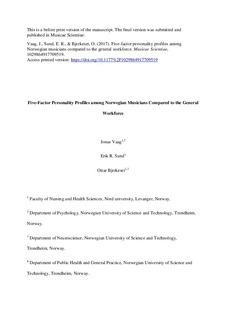Five-factor personality profiles among Norwegian musicians compared to the general workforce
Journal article
Submitted version
Permanent lenke
http://hdl.handle.net/11250/2566753Utgivelsesdato
2018Metadata
Vis full innførselSamlinger
- Institutt for psykisk helse [1216]
- Institutt for psykologi [2970]
- Publikasjoner fra CRIStin - NTNU [37703]
Sammendrag
The aim of the study was to investigate differences in personality traits between professional musicians and the general workforce, as well as differences in personality traits across subgroups of musicians according to types of employment and instrument group. In 2013, 1,600 members of the Norwegian Musicians’ Union answered a questionnaire regarding type of employment, instrument group and a shortened version of the Big Five Inventory (BFI-20). The musicians were compared to a sample of the general Norwegian workforce (n = 6,372) that answered the same personality questionnaire in the Norwegian Generation and Gender Survey of 2007. Multivariable linear regression, adjusted for age, gender, marital status and education, showed that musicians displayed higher degrees of neuroticism and openness to experience, as well as lower degrees of conscientiousness, than the general workforce. A higher degree of openness to experience was especially evident among freelance musicians and those who combined freelance work with employment. Findings also differed according to musicians’ instrument groups, with vocalists scoring higher on openness to experience and bowed string players scoring higher on neuroticism and introversion. In sum, musicians displayed somewhat different patterns of personality traits compared to the general workforce, but our results did not support some of the previously held notions of a specific distinguishable personality structure of musicians. Somewhat unsurprisingly, the major distinguishable trait of musicians was a heightened degree of openness to experience.
